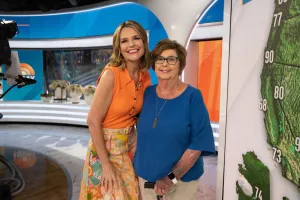Rob Peace is a biographical drama film written and directed by Chiwetel Ejiofor. Ejiofor, whose credits include Four Brothers and 12 Years a Slave, also stars in the film as the title character’s father. The film is based on the 2014 biography, The Short and Tragic Life of Robert Peace by Yale graduate, and Peace’s college roommate, Jeff Hobbs. The film premiered at the 2024 Sundance Film Festival and will be released nationwide on Aug. 16.
Peace was lauded as a genius, and escaped his inner-city surroundings via his academics, which led him to the Ivy League. But, his desire to help his incarcerated father led him to a lifestyle split by academia and drug dealing. He’d ultimately be shot and killed at age 30 amid a drug-related robbery. Ahead of the film’s release, Ejiofor spoke with PopCulture about what drew him to Peace’s story.
Videos by PopCulture.com
PC: Why did you feel as if Rob Peace’s story deserved to be told via film?
CE: I just thought it was impactful. I read the book and I found it incredibly emotional and it spoke to certain things that I had been thinking about. And, in a slightly more, perhaps more random way. Jeff Hobbs, Rob’s roommate at Yale, had really organized a story that I felt really spoke to not only the charisma and kind of brilliance of Rob but also the sort of systemic challenges that he faced. And being able to talk about those kinds of intersections of race and housing and the criminal justice system and education, and the ways in which those things, in Rob’s experience, combined to make, to make certain aspects of his life extremely challenging and have these kinds of real uphill challenges.
But at the same time, he was a person who was able to really embrace people, and a connector and somebody who was able to really bring people together. And it felt like there was something both meaningful about the story and inspirational about the story and kind of a sort of warning about the story as well. But there was something that there was a lot to consider. So I felt it would be rich cinematically.
As it relates to the socioeconomic issues that Rob dealt with in his real life, how timely do you feel his story is as it relates to what’s currently happening socially?
I think it’s really important to continue to have conversations about what allyship means. I think that Rob was let down in many ways by the systems around him. And I think that understanding how he was let down by these systems, how he was let down by these kinds of realities, is important if we’re trying to create a society where people like Rob are genuinely able to thrive. And I think that it’s about understanding the difficulties that the system has. I think that people tend to think about social mobility in very simplistic terms, but social mobility, obviously, Rob’s story is an extreme example of this. But I think for a lot of people, in fact, from a host of different communities, find the challenges within social mobility. I think it was more exacerbated in Rob, and I think that it’s a very important thing to keep sight of with the way that our society can continue to engage and support and allow people like Rob to thrive.
Now tell us about your preparation for the film. I know you said you read the book. What else did you do?
I spent a lot of time in the oranges – in East Orange, New Jersey. I spent time with Jackie Peace, Rob’s mother. I spent a lot of time at the house where he grew up, and speaking to people who knew Rob. I spent time at his school, Saint Benedict’s, his high school. And actually, we filmed at Saint Benedict’s. And so we got a very specific insight about his experience there and how he was seen and who he was kind of engaged with as far as the teachers who were still there at the school. And then I spent a lot of time at Yale.
I spent time with the department that Rob was in the molecular biophysics and biochemistry department. I spent time speaking to faculty and also students at Yale about their experiences and how they related to Rob’s experience. I heard a lot about how it adds to some of these pressures, sometimes not meaning to, but on Black students and how there is still a process of evolving that the schools need to have and are engaged with some of them in these elite spaces and what they mean…and how Rob sat within all of those things. So there was a sort of comprehensive look at the different communities, spaces, environments, and dynamics that Rob found himself in. And, that was the kind of way that I started to approach telling his story.
You mentioned earlier how this story could serve as a warning. What’s the ultimate lesson from Rob’s life?
I think in terms of the challenges he faced, they speak to what our responsibilities are, what our responsibilities are to those around us, what our responsibilities are from those around us to us, and how sometimes complicated that dynamic is and how we make those choices. I feel ultimately that Rob needed a various amounts of support that he didn’t find, and some of the reasons that he didn’t find it were because the systems around him didn’t allow him to fully thrive, didn’t allow him to to rely on people, especially outside of his familial home with the support that he needed to achieve what I think would have been an absolutely extraordinary life experience. So I feel that trying to bear witness to his experience, to understand his experience, to move away from what I found was the written about Rob, which at the time in the media I thought was hugely judgmental of Rob.








